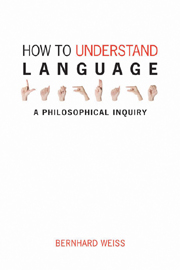Book contents
- Frontmatter
- Contents
- Preface
- 1 The puzzles of language
- 2 The starting-point for analysis
- 3 Analysing sentence-meaning
- 4 Analysing synonymy
- 5 Radical translation
- 6 The structure of a theory of meaning
- 7 Radical interpretation
- 8 Linguistic norms, communication and radical interpretation
- 9 Linguistic normativity
- 10 Radical or robust?
- 11 Language and community
- 12 Rules and privacy: the problem
- 13 Rules and privacy: the solution?
- 14 Truth-conditions versus use-conditions
- Notes
- Bibliography
- Index
Preface
- Frontmatter
- Contents
- Preface
- 1 The puzzles of language
- 2 The starting-point for analysis
- 3 Analysing sentence-meaning
- 4 Analysing synonymy
- 5 Radical translation
- 6 The structure of a theory of meaning
- 7 Radical interpretation
- 8 Linguistic norms, communication and radical interpretation
- 9 Linguistic normativity
- 10 Radical or robust?
- 11 Language and community
- 12 Rules and privacy: the problem
- 13 Rules and privacy: the solution?
- 14 Truth-conditions versus use-conditions
- Notes
- Bibliography
- Index
Summary
The course of true argument does not always run smooth. Obviously I hope the argument presented here is close to “true” and I have done my level best in the text to keep it smooth. But I can do more: the next few pages give an overview of the argument and place each chapter in its development. This should help to set readers up for what is coming and may help them negotiate their way through some of the transitions.
I begin, in the opening chapter, by drawing out some of the reasons that language is philosophically puzzling. The chapter should not be read as cataloguing a set of questions to which we require a philosophical answer. One might well wish that the discipline were as clear-cut as that. Rather, there are a number of apparently puzzling facets of language and one might take different approaches to them. What one philosopher sees as a genuine source of puzzlement another will dismiss as some sort of confusion; where one takes a feature to stand in need of explanation another will take that same feature as fundamentally explanatory; where one proposes a certain form of explanation another will offer an alternative. So, in the face of these mysteries about language, we seek an approach. My first task thus becomes that of finding a productive approach to the philosophical understanding of language.
- Type
- Chapter
- Information
- How to Understand LanguageA Philosophical Inquiry, pp. ix - xivPublisher: Acumen PublishingPrint publication year: 2009



